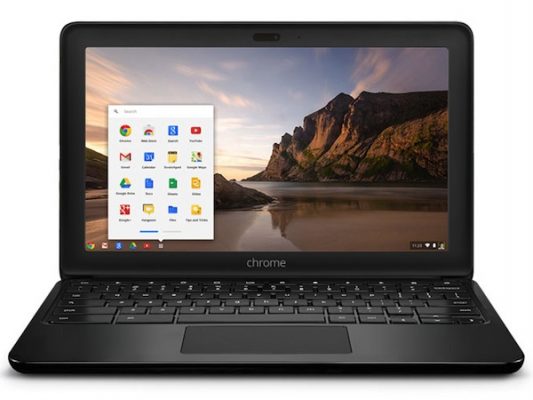Google: All New Chromebooks Will Support Android Apps
Google said in May 2016 that select Chromebooks–laptops built entirely around its Chrome browser–would support apps originally made for Android devices. Now the company has updated the list of devices gaining access to the Google Play marketplace to include every Chromebook debuting in 2017.
Chromebooks were built with the belief that many consumers don’t need high-power computers. Most people want to be able to handle some documents, listen to music, and dilly-dally on social networks. All of those things can be accomplished through a web browser, so Google turned its Chrome browser into a bona fide operating system manufacturers could use to make low-end laptops at even lower prices. Voila! A platform was born.
It didn’t take long for Chromebooks to grow popular. The NPD research group said in August 2015that Chromebooks helped keep overall PC and tablet sales in the business-to-business market from tumbling in the preceding quarters. IDC analyst Linn Huang said in May 2016 that Chrome OS devices (Chromebooks and their desktop counterparts) outsold Apple computers for the first time in the beginning of the year. Chromebooks were getting hot.
Yet they weren’t perfect. A laptop that relies on the web is only as reliable as the internet connection between the two. People can use Chromebooks to edit documents, look at photos, or watch videos without an internet connection, but the devices are still far more hamstrung by a lack of connectivity than a traditional laptop would be. The devices were also limited in their ability to work with Microsoft Office documents, which are still ubiquitous despite competition from Google and other companies, or with software that isn’t available online.
That’s why Google brought the Play Store to Chromebooks. Here’s what the company said in its May 2016 announcement:
Chromebooks have always been about making computing more accessible for everyone, and by bringing together the best of Android and Chrome OS, we are taking a big leap forward. Not only are we addressing many of the existing needs and use cases that people have for their Chromebooks, we are also betting on the millions of developers who are innovating every day to build the next great experience that wasn’t even possible on PC platforms before.
Google called out popular mobile games like Clash of Clans, apps that play better with Microsoft Office, and other Android software in its announcement. The web is broad, but the rise of mobile software has led to many utilities that exist only within the confines of major app marketplaces. Chromebooks still won’t replace more powerful laptops and all the games and software they’re able to run, but they could at least expand beyond the world wide web.
This revolution started off slow. Right now just three products boast compatibility with Android apps: the Asus Chromebook Flip, the Acer Chromebook R11 / C738T, and the 2015 version of Google’s own Chromebook Pixel. The company said it “won’t be able to bring Android apps to every Chromebook ever made” but is “continuing to evaluate more devices based on a range of factors, like processor type, GPU, and drivers” for Play Store compatibility.
Now, that paltry list of three devices will expand to include 61 products from Acer, Asus, Lenovo, and other manufacturers. Some of the products are expected to debut in 2017; others have already been released and will receive updates with Play Store compatibility. The flood gates have opened: Google said “all Chromebooks launching in 2017 and after” will be able to run Android apps. The platform has finally gone beyond the browser.


